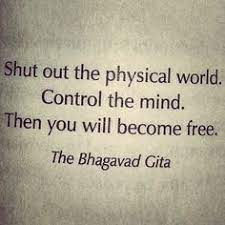Quote from the True charm and power of Vedanta
The Buddhi of Vedanta as Creative Faith-Reason
Reason and intellect become creative when faith is immerged within. This is the budhi of Vedanta Buddhi combines the creativity of sraddha, with its sensitiveness to values, with the analytical power of the intellect with its grasp of facts and adds also the power of pure will to itself. This is buddhi as the integral unity of faith reason will evolved by man out of the neuro psychic energies given by nature within him and capable of leading him not only to discoveries in science, physical or spiritual but also to the creation of great art, and to life fulfillment itself individual and collective.
It is thus obvious that the translation of buddhi as intellect severely limits it scope and meaning Vedanta reveals its true from, when it presents it as the faculty of luminous and creative and dynamic reason ., it is highly eulogized in the Upanishads and the Gita . The Gita tells man to put his or her life under its guidance ’-buddhas saranam anviccha . Buddhi restores to the world. And to human life, the poetry and charm and was taken away by the intellect for its limited and specific handling of both the katha Upanisad summons man to put the chariot of his life under the guidance not of the chariot i.e his body, not of the horses i.e, his sensory system nor the reins i.e,, his phsycic system, but of the charioteer, ie, his injannha I, e buddhi or ‘enlightened reason’
Chariot and golden deer as powerful metaphors
By K Vikram Simha Rao
Indic philosophy is rich in usage of metaphors and analogies to explain difficult concepts in a simple manner. Epics like the Ramayan and Mahabharat and scriptures like the Upanishads have resorted to such examples to illustrate ideas even through various human characters.
Let us take two examples of ‘chariot’ and ‘golden deer’. In the Katha
Upanishad, there is an attempt to describe the human form as a chariot – the
senses are its horses, mind is its reins, intellect is the charioteer and the
passenger is the jivatman, individual soul. This metaphor, thus, shows that we
are distinct from our physical body, senses, mind and the intellect, just as
the passenger of the chariot is separate from the chariot, horses, rein and the
charioteer. The path traversed by the chariot and its surroundings are the
sense objects – the samsara. There is a natural tendency of the mind and senses
to get attracted to or repelled by the sense objects, which has a serious
bearing on the movement of the chariot and its passenger. The intellect finally
decides to either overpower the demands of the fickle mind or yield to its
temptations.
Katha Upanishad concludes that ‘He, who has the understanding of the
driver of the chariot and controls the rein of his mind, reaches the end of the
journey, that Supreme Abode of the All-pervading.’
The explanation of chariot is made more explicit in the Mahabharat. In the
final war, Prince Arjun is seen sitting as a passenger in a chariot driven by
Krishn. Arjun could have chosen anyone among the many skilful charioteers
available at that time, but he chose Krishn as he had full faith in his ability
and guidance, thus replacing his own limited intellect. Arjun represents the
individual soul fully surrendering to Krishn, the Paramatman, the Universal
Soul, to ensure his safe and successful journey.
The Ramcharitmanas deals with dangers that arise when an individual soul
tries to distance itself from the universal soul. There is a description of the
turning point wherein Sita is seen attracted to a ‘golden deer’ in the forest
and she seeks to possess it. Ram goes in search of it in the forest, leaving
her behind. When Sita is alone, devoid of the company of Ram, she is abducted
by Demon King Ravan. We know that after marriage of the Divine Couple and their
shifting to the forest, both Ram, representing universal soul, and Sita,
representing us as individual soul, were living in a state of bliss in total
communion with each other. The moment Sita is enchanted by the appearance of
maya, the golden deer, thus downplaying the primacy of Ram, she gets possessed
by Ravan representing dreadful ego and samsara. She then realises her mistake.
Her suffering and pangs of separation come to an end only on reunion with Ram,
thus bringing back the individual soul in full and blissful company of the
universal soul.
Examples of the chariot and golden deer can, therefore, remind spiritual
seekers time and again that God realisation is possible and maya can be kept at
bay only by invoking the grace of the universal soul.
IF HE EXIST
I drive joy there was a doctor in
Benaras who spent 7 minutes in the morning and evening for mediation on God.
Knowing this, his colleagues and friends laughed at him. One day they argued
that he was wasting 7 precious minutes on something, which he had been misled
into believing. The doctor replied, “Well, if God does not exist, I agree that
I am wasting 7 minutes a day. But, if He exists? I am afraid you are wasting
your entire lifetime. I prefer to waste 7 minutes rather than a lifetime. Why
should you grudge me the 7minutes joy that I derive 4m.-
ILLUSTRATED REVIEW : 7th heaven moment of
the week India won first one day scoring
308/7


















